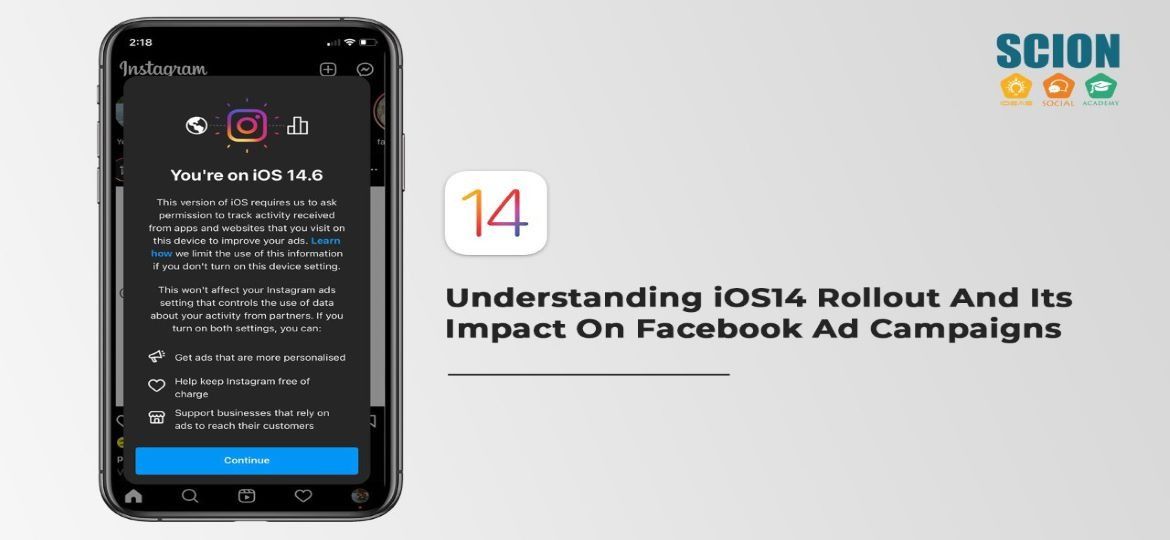
To all the Apple users, did you recently notice that while downloading or logging into any app, there was a pop-up asking if you wanted the app to track data?
Most of you might have clicked on the ‘Ask app not to track’ option without worrying too much about it.
But why do you think Apple is suddenly showing this popup?
Well, that’s Apple’s new iOS update and as part of this update, users will now have the choice to block the IDFA (identifier at the app level). Which means if you don’t grant the permission to the app, none of your data will be visible to it.
And, this will directly affect the ad campaigns of advertisers who are planning to target you on that particular app!
Studies suggest that currently 70% of iOS users share their IDFA with app publishers whereas after this change the number will drop to 10% to 15%.
Because with this update you’ll now have the choice of whether to give consent for tracking your information. Upon denial, paid advertising will suffer because the advertisers won’t get any data about your location, interests, gender, likes and so on.
Bummer for all the advertisers, right?
Most platforms like Facebook, Google, Snapchat, TikTok are planning to use Apple’s SKAdNetwork in response to this update.
For cases where IDFA is not present, Apple has designed a SKAdNetwork that allows for permissionless privacy-centric, aggregated attribution. It was first released in 2018 to help marketers track users who turned on the Limited Ad Tracking feature.
However, the recently updated version allows marketers to measure attribution of mobile advertising on iOS and provide a variety of functions for mobile advertisers.
But why is Apple doing this?
The two main reasons are to make users aware of what data an app will track and to give the user the choice to opt-in or opt-out to tracking when an app is installed.
While the update is getting a lot of backlash and countless questions from advertisers and app developers, tech giants like Google and Facebook have started to respond to this change. Google is looking to switch its user-tracking software to comply with the new policies and Facebook has said that it expects the new policy to damage ad targeting.
How Does It Affect The Advertisers?
The advertising areas that will be impacted with this roll out are:
- Ad Targeting: Targeting audiences will be more limited in the absence of IDFAs. Now, targeting is expected to be more contextual, rather than based on user attributes and behaviours. By focusing on context, app marketing is focused to reach broader audiences who will be less ready to buy.
- Ad Measurement and Attribution: Understanding the impact of your mobile advertising in iOS14 will become strenuous as fewer new users would be traced back to an advertising touchpoint at a user-level.
- Mobile Advertising Performance: With shorter lookback windows, no view-through attribution, visibility constraints and much less revenue able to be attributed back to a campaign, performance from mobile advertising on iOS14 is expected to look dramatically worse.
- Cohort Analysis: Cohort analysis is determination of performance from the day the ad impressions are served. In marketing, cohorts are subsets of users grouped by a date: either acquisition or ad exposure date. Now without IDFAs, cohort analysis will be unusable. This is expected to harm optimisation and may skew results.
What is Apple Saying?
In response to the backlash from advertisers and specifically Facebook, Apple released this statement:
“We believe that this is a simple matter of standing up for our users. Users should know when their data is being collected and shared across other apps and websites — and they should have the choice to allow that or not. App Tracking Transparency in iOS 14 does not require Facebook to change its approach to tracking users and creating targeted advertising, it simply requires them to give users a choice.”
In response to the iOS 14 changes, Facebook also released an official statement highlighting the future changes that will help users measure the performance of campaigns effectively. With pixel conversion events from iOS 14 devices using Aggregated Event Measurement and additional resources to support businesses advertising, here’s what Facebook is planning to do > Facebook’s Response
What are Advertisers noticing and how are they dealing with this?
- Reduction in the time period of how long back FB track can affect users’ journey so that affects the way we can track user journey. Now it is restricted to only 7 days as opposed to 28 days
- But data that is already with FB still stays with them so advertisers are still able to use previous data. The new data is trickling in as opposed to free flowing information like before the update
- Some people haven’t seen any change whereas some have seen a massive drop off
- Algorithms are now confused because a large chunk of user data is now not generating enough repetitions for ist to learn from.
- Use fresh creatives, new audiences (especially custom, re upload it if needed) that way the algo starts re-opinionation the ad assets
- Retargeting ads will be tough especially users who have opted out of IDFA
- Conversion numbers may not match from actual data to the console data
- Stunted algorithm learning due to less data available on evolving audience
With Scion we can take on this challenge together. We can work on what’s working, find newer audiences, use emails and lists for retargeting instead of going by Facebook data only.
Also high time FB opens up its organic reach on business page if it is so concerned about small businesses and the effects of iOS14 changes.

[…] face it: Without the right research, Facebook advertising is a lot harder to get […]
[…] Reeling from Apple’s introduction of the ‘do not track’ feature, Facebook is bound to develop new ways of tracking target audiences. It may leverage it’s […]